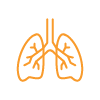What is Pneumonia Disease?
December 7, 2022

A lung infection called pneumonia can range in severity from being minor to necessitating hospitalization.
It takes place when an infection causes the alveoli, or lung air sacs, to swell up with fluid or pus. As a result, you may find it challenging to breathe in adequate oxygen for your bloodstream may be challenging.
This lung infection can affect anyone. However, those under two years old and those over 65 have a larger risk. That’s because their immune systems might not be capable of defending themselves.
Pneumonia can affect one or both of your lungs. “Walking pneumonia” is the term used by doctors. Bacteria, viruses, and fungi are some of the causes. In addition, you can spread pneumonia to another person.
Lifestyle choices like excessive alcohol consumption and cigarette smoking can also increase your risk of developing pneumonia.
What distinguishes bacteria from viral pneumonia?
All pneumonia is inflammation brought on by a lung infection, but depending on whether a virus, bacteria, or fungus is to blame, you may experience various symptoms.
Viral pneumonia is less prevalent and usually not as severe as bacterial pneumonia. Providers use antibiotics to treat bacterial pneumonia. Symptoms are more familiar with viral pneumonia, likely to go away independently.
What are the types of pneumonia?
We divide pneumonia into community-acquired, hospital-acquired, and ventilator-associated pneumonia. Pathogens that cause pneumonia include viruses, bacteria, and fungi.
Symptoms
The signs and symptoms of pneumonia range from minor to fatal. They may consist of the following:
- Coughing that could result in phlegm (mucus)
- Fever
- Chest pain that gets worse when you breathe or cough, fever or chills, shortness of breath that occurs even while you’re at rest
- Fatigue or a sensation of exhaustion
- Reduced appetite
- Headaches
- Nausea or vomiting
The following additional symptoms can vary depending on your age and general health:
- While they may not show symptoms, infants can occasionally vomit, feel lethargic, or have problems drinking or eating.
- Children under the age of five may wheeze or breathe quickly.
- Symptoms may be less severe in older persons.
However, they may also feel confused or lower body temperature than usual.
Symptoms of bacterial pneumonia
Bacterial pneumonia symptoms may appear gradually or unexpectedly. These signs include:
- Extreme fever
- Cough up green, yellow, or red mucus
- Tiredness (fatigue)
- Quick breathing
- Respiration difficulty
- Quick heartbeat
- Chills or perspiration
- Stomach or chest pain, especially when coughing or taking big breaths
- Decrease in appetite
- Bluish lips, nails, or skin
- Confusion or a changed state of mind
Pneumonia brought on by a virus
The signs of viral pneumonia typically appear over a few days. You may have symptoms of bacterial pneumonia in addition to the following:
- Dry cough
- Headache
- muscle ache
- Extreme weakness or fatigue
Pneumonia symptoms in young children
Pneumonia symptoms in infants and new-borns can differ from those in adults, or they may not manifest at all, including:
- Fever, chills, general unease, and flushed or perspiring skin
- Cough
- Breathing difficulty or fast breathing (tachypnea).
- Decrease in appetite.
- Vomiting.
- Lacking in energy
- Agitation or restlessness.
The following signs can be seen in infants and early children:
- Breathing that makes a grunting noise or is noisy
- A lesser amount of pee or fewer saturated diapers
- Limpness
- More tears than usual
- A problem feeding
Causes of Pneumonia
Fungus, viruses, or bacteria can bring on pneumonia.
Common causes include
- A flu virus
- Cold viruses
- RSV virus (the top cause of pneumonia in babies age one or younger)
- Streptococcus pneumonia and Mycoplasma pneumonia bacteria
Hospitalised patients who contract an infection while using a ventilator, a machine that helps you breathe, may develop “ventilator-associated pneumonia.”
“Hospital-acquired” pneumonia develops when a patient is admitted to the hospital but isn’t using a ventilator. But most people develop “community-acquired pneumonia,” which means they weren’t hospitalised when they did.
How is pneumonia diagnosed?
A medical professional will inquire about your medical history and do a physical exam to identify pneumonia. Then, they’ll use a stethoscope to listen to your lungs and perform or prescribe another test. These consist of imaging (such as X-rays of the chest), pulse oximetry (measuring the amount of oxygen in your blood), blood testing, or sputum (spit) studies.
Your doctor may not always be able to determine the precise cause of pneumonia, even after confirming that you have it.
Home remedies
Even while there are certain things you may do to lessen symptoms, home remedies don’t treat pneumonia.
One of the most typical signs of pneumonia is coughing. Salt water gargles and peppermint tea are two natural remedies for coughs.
The use of cool compresses can help lower a fever. Chills can be relieved by sipping warm water or eating a bowl of soup. Here are some other home cures.
Get enough sleep and drink lots of water to hasten your recovery and avoid a recurrence.
Even though home remedies can lessen symptoms, following your treatment plan is crucial. First, follow the directions on any prescription drugs.
When does a cough become pneumonia?
You’ve been coughing for a long, but it seems like your cough is growing worse rather than better. You can even be coughing up phlegm or experiencing chest pain when you cough. Those are indications that pneumonia may be the cause of your cough.
A lung infection known as pneumonia can be moderate to life-threatening and causes your lungs to swell with fluid or pus. You can have a fever or respiratory problems.
Knowing the signs of pneumonia and when to visit the doctor can ease your mind whether you’ve had your cough for three days or three weeks.
Is pneumonia contagious?
Although pneumonia is not contagious, viruses and bacteria that cause it are. For instance, the flu can cause pneumonia and is contagious, although the majority of the people who contract the flu do not develop pneumonia.
Streptococcus pneumonia, the bacterium that most frequently causes pneumonia, can be transferred from one person to another by touching contaminated surfaces or coughing and sneezing.
Fungus-caused pneumonia is not contagious. Like viruses and bacteria, fungi do not transfer from person to person.
Why would you need to see a pulmonologist?
Your normal doctor may recommend seeing a pulmonologist if you have symptoms they can’t treat or believe you might benefit from seeing a specialist. These can be a few of the warning signs and symptoms:
- Cough that doesn’t get better with time (chronic cough).
- Breathing difficulty (dyspnea).
- chest discomfort or stiffness
- Wheezing.
- Symptoms of sleep apnea, such as loud snoring or excessive exhaustion.
- Dizziness.
If you already have a respiratory disease, you can keep going to your scheduled checkups to take care of yourself.
People also ask
How serious is pneumonia?
The severity of pneumonia can range from mild to life-threatening. The most vulnerable groups include infants and young children, adults over 65, and those with health conditions or weakened immune systems.
How long is recovery from pneumonia?
The recovery from pneumonia may be prolonged. They can resume their regular schedules in one to two weeks. Others may require a month or more. Then, for about a month, most people continue to feel exhausted.
What helps pneumonia go away faster?
Rest, medicines, and increased fluid intake make up the typical treatment regimen for pneumonia. Even if your symptoms start to go away, you still need to take it easy. Your doctor might recommend an antiviral medication rather than an antibiotic depending on the cause of your pneumonia.








